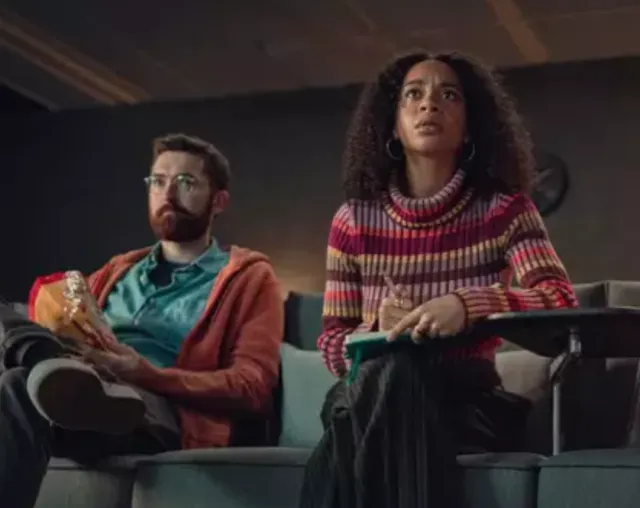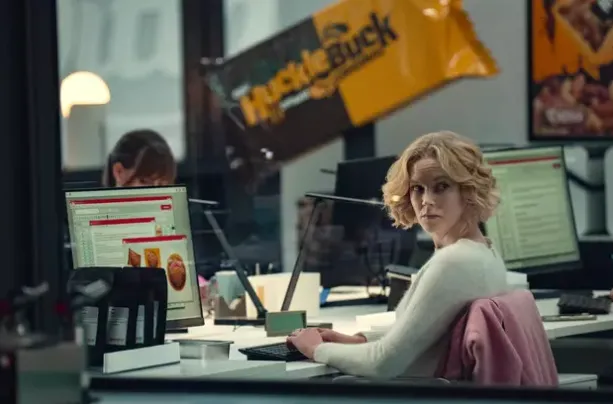Netflix’s Black Mirror is blurring fiction and reality — this time by showing different versions of the same episode to viewers.
A mind-bending return for Black Mirror season 7
The long-awaited seventh season of Black Mirror premiered on April 10, and it didn’t take long for fans to start questioning what they were seeing — quite literally.
In the second episode, Bête Noire, viewers follow Maria (Siena Kelly), a woman whose sense of reality slowly unravels after reconnecting with her high school nemesis Verity (Rosy McEwen). Using a high-tech pendant, Verity manipulates Maria’s world — changing facts, memories, and objects that no one else seems to notice.
But the episode’s chilling psychological themes aren’t just happening on screen.

Fans spot subtle but shocking differences
The biggest twist? Audiences noticed that they were seeing different versions of the same scene.
In one key moment, Maria insists her boyfriend used to work at a fast-food place called “Barnie’s.” The show supports her claim — his red and white cap bears the logo.
But when Maria checks online, she finds the restaurant listed as “Bernie’s.” Even the hat’s spelling seems to change.
Some viewers saw “Barnie’s” throughout the episode. Others, however, clearly saw “Bernie’s.”
This sparked widespread confusion — and fascination.

Black Mirror viewers experience a real-life mandela effect
Dozens of fans took to social media to compare notes — and screenshots — at the same timestamp (around 16:40).
Some were certain the chicken shop was “Barnie’s,” while others swore it read “Bernie’s.”
In some cases, friends watching the episode simultaneously saw two completely different spellings.
“My friend and I were watching the new Black Mirror episode Bête Noire and noticed a stark difference… even the viewers are getting gaslit,” one user tweeted.
This eerie detail perfectly mirrors the episode’s themes — and suggests Black Mirror may be experimenting with viewer manipulation in real-time.

Is Netflix secretly distributing two versions?
The internet was quick to form theories.
Some believe this is a deliberate tactic — that Netflix is randomly distributing two versions of the episode to play with audience perception.
Others suspect it may be a glitch or an incredibly well-executed Easter egg.
“Black Mirror filming two versions of the Bernie’s/Barnie’s scene and distributing them randomly is next-level diabolical,” one viewer commented.
Regardless of the explanation, fans agree that it’s a classic Black Mirror move — twisting reality in ways that make the viewer question everything.
Why this episode reinforces the genius of Black Mirror
So my friend and I were watching the new Black Mirror episode “Bête Noire” and we noticed that there was a stark difference between our episodes… even the viewers are getting gaslit at 16:40! #BlackMirrorS7 pic.twitter.com/G2Ne1SuvJV
— Vastolorde | AKIO 🫡💖🇺🇸 (@actualakio) April 10, 2025
This unexpected twist is more than just a gimmick — it aligns perfectly with Black Mirror’s core themes: the instability of perception, the unreliability of memory, and the manipulative power of technology.
“This is what Black Mirror is all about,” one fan wrote.“They’ve made us feel like Maria — unsure of what’s real.”“Chaotic genius. The Mandela effect in full force.”
Whether by design or coincidence, Bête Noire has become one of the most talked-about episodes in the show’s history — not just for its plot, but for the way it’s being experienced differently by everyone.
Black Mirror breaks boundaries with innovative storytelling
With this possible dual-version experiment, Black Mirror continues to redefine what television can be.
It’s not just a passive viewing experience — it’s an interactive psychological journey that follows you off the screen.
By pulling viewers into the same disorientation as its characters, Black Mirror reminds us why it remains one of the most unsettling — and brilliant — shows of our time.